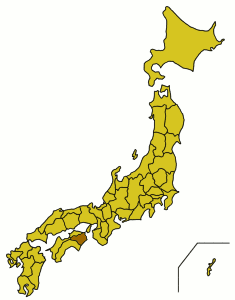
Tokushima Prefecture (徳島県 Tokushima-ken) is on the eastern side of the Japanese island of Shikoku.
Understand
editTokushima used to be known as the province of Awa (阿波). The nearby island of Awaji, now a part of Hyogo prefecture, literally means "road to Awa".
Tourist information site
editDiscover Tokushima is the prefecture's official multilingual guide site.
Cities
edit- 1 Tokushima — the prefectural capital, known for its yearly Awa Odori festival.
- 2 Naruto — the gateway to/from Awaji-shima, the home of the whirlpools (Uzushio), the seat of Tokushima's Shikoku League baseball team (the Indigo Socks), and the starting point of the 88 Temple Pilgrimage.
- 3 Miyoshi
- 1 Ikeda — jumping-off point for Iya Valley and the gorges of Oboke and Koboke
- 4 Mima - a town famous for its Udatsu historic district
- 5 Awa
- 6 Anan
- 7 Yoshinogawa
- 8 Higashimiyoshi
Other destinations
edit
Get in
editBy plane
editThe nearest major international airport is Kansai.
Pint-sized Tokushima Airport (TKS IATA), to the north of Tokushima City, has daily services from Tokyo, Nagoya, Fukuoka and Sapporo. Buses to Tokushima station take 25 minutes and cost ¥430, the schedules are synchronized to flight departures and arrivals. Kobe Airport (UKB IATA) is also a viable alternative for domestic connections.
By train
editBy bus
editDirect buses from Kobe (2 hr) and other points in Kansai connect to Tokushima via Awaji Island.
By ferry
editFerries run several times a day between Wakayama and Tokushima City (2 hr), and there is one boat per day to both Kitakyushu (14½ hr) and Tokyo (17½ hr).
Get around
editSee
edit
- Tokushima's best scenery can be found in the rugged and mountainous western end. Best known are the treacherous ravines of Oboke and Koboke, but nearby Iya Valley's vine bridges are also famous.
- Tairyuji Temple: a temple along the pilgrimage route of temples. A ropeway is available as an alternative to the climb to get there.
Do
editTokushima's biggest yearly event is the Awa Odori dance, held in yearly in August in Tokushima City.
- Iya Valley, one of Japan's Top 3 Hidden Valleys, offers many hiking opportunities including Mt. Tsurugi, the second-highest peak in Shikoku.
Eat
edit- Naruto Kintoki - Some of the world's finest sweet potatoes. They are unique thanks to the special sandy soil in which they are grown. Unlike regular sweet potato fields, the sandy soil in Naruto forms a thin crust at the surface which allows the potatoes to grow undisturbed and develop their superb flavor and texture. Naruto Kintoki can be prepared in numerous ways and are also used for brewing Shochu (Japanese Liquor). For those eating it for the first time, try it plain in order to sense its qualities with no distractions. One way to do so is by wrapping the potato tightly in foil and letting it bake in the oven till it softens. The aroma alone is worth experiencing, and the taste will make you melt.

